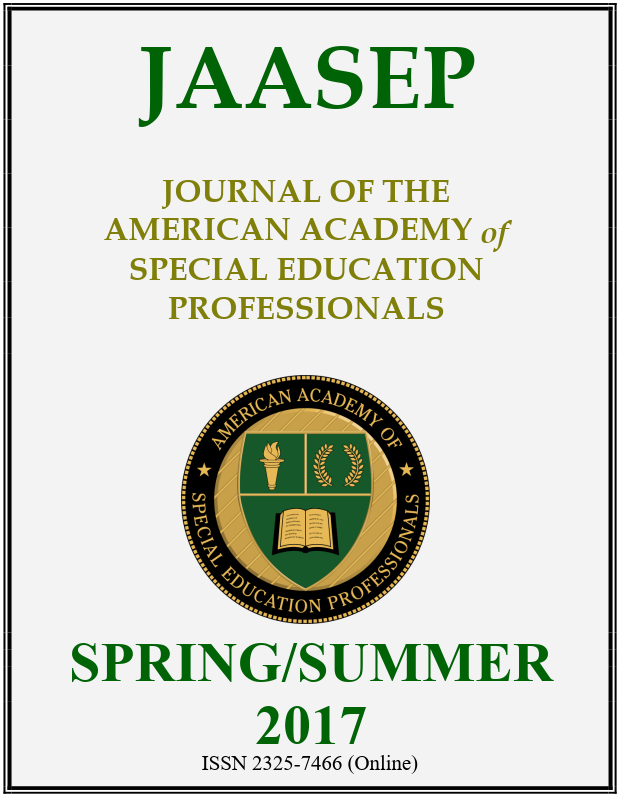Parents are the Experts: Understanding Parent Knowledge and the Strategies They Use to Foster Collaboration with Special Education Teams
Angell, M. E., Stoner, J. B., & Shelden, D. L. (2009). Trust in education professionals: Perspectives of mothers with disabilities. Remedial and Special Education. doi:10.1177/0741932508315648 DOI: https://doi.org/10.1177/0741932508315648
Blue-Banning, M., Summers, J. A., Frankland, H. C., Nelson, L. L., & Beegle, G. (2004). Dimensions of family and professional partnerships: Constructive guidelines for collaboration. Exceptional Children, 70(2), 167-184. DOI: https://doi.org/10.1177/001440290407000203
Cheatham, G. A., Hart, J. E., Malian, I., & McDonald, J. (2012). Six things to never say or hear during an iep meeting: Educators as advocates for families. Teaching Exceptional Children, 44(3), 50-57. DOI: https://doi.org/10.1177/004005991204400306
Cook, B. G., Shepherd, K. G., Cook, S. C., & Cook, L. (2012). Facilitating the effective implementation of evidence-based practices through teacher-parent collaboration. TeachingExceptional Children, 44(3), 22-30. DOI: https://doi.org/10.1177/004005991204400303
Creswell, J. W. (2007). Qualitative inquiry and research design: choosing among five traditions. Thousand Oaks, CA: Sage Publications.deFur, S. (2012). Parents as collaborators: Building partnerships with school and community-based providers. Teaching Exceptional Children, 44(3), 58-67. DOI: https://doi.org/10.1177/004005991204400307
Edwards, C. C., & Da Fonte, A. (2012). The 5-point plan: Fostering successful partnerships with families of students with disabilities. Teaching Exceptional Children, 44(3), 6-13. DOI: https://doi.org/10.1177/004005991204400301
Fialka, J. (2001). The dance of partnership: Why do my feet hurt? Young Exceptional Children, 4(2), 21-27. DOI: https://doi.org/10.1177/109625060100400204
Fish, W. W. (2008). The IEP meeting: Perceptions of parents of students who receive special education services. Preventing School Failure, 53(1). DOI: https://doi.org/10.3200/PSFL.53.1.8-14
Friend, M., & Cook, L. (2010). Interactions: Collaboration skills for school professionals (6th ed.). Boston, MA: Pearson Education.
Hess, R.S., Molina, A.M., & Kozleski, E.B. (2006). Until somebody hears me: Parent voice and advocacy in special education decision-making. British Journal of Special Education, 33, (3). DOI: https://doi.org/10.1111/j.1467-8578.2006.00430.x
Harry, B. (2008). Collaboration with culturally and linguistically diverse families: Ideal versus reality. Exceptional Children, 74(3), 372-388. DOI: https://doi.org/10.1177/001440290807400306
Harry, B., Kalyanpur, M., & Day, M. (2005). Building cultural reciprocity with families: Case studies in special education. Baltimore, MD: Paul H. Brookes Publishing Co. Individuals with Disabilities Education Act, Section 601(c)(5), Findings, PL 108-446 (2004). Retrieved from http://www.nichcy.org/docs/PL108-446.pdf
Kalyanpur, M., & Harry, B. (2012). Cultural reciprocity in special education: Building family-professional relationships. Baltimore, MD: Paul H. Brookes Publishing co.
Kearney, K. S., & Hyle, A. E. (2004). Drawing out emotions: The use of participant-produced drawings in qualitative inquiry. Qualitative Research, 4(3), 361-382. doi:10.1177/1468794104047234 DOI: https://doi.org/10.1177/1468794104047234
Lo, L. (2012). Demystifying the iep process for diverse parents of children with disabilities. TeachingExceptional Children, 44(3), 14-20. DOI: https://doi.org/10.1177/004005991204400302
Miles, M. B., & Huberman, A. M. (1994). Qualitatitve data analysis: An expanded sourcebook. Thousand Oaks, CA: Sage Publications.
Mueller, T. G. (2009). IEP Facilitation: A promising approach to resolving conflicts between families and schools. Teaching Exceptional Children, 41(3), 60-67. DOI: https://doi.org/10.1177/004005990904100307
Olivos, E. M. (2009). Collaboration with latino families: A critical perspective of home-school interactions. Intervention in School and Clinic, 45(2), 109-115. DOI: https://doi.org/10.1177/1053451209340220
Ruppar, A. L., & Gaffney, J. S. (2011). Individualized education program team decisions: A preliminary study of conversations, negotiations, and power. Research & Practice for Persons with Severe Disabilities, 36(2), 11-22. DOI: https://doi.org/10.2511/rpsd.36.1-2.11
Saldana, J. (2009). The coding manual for qualitative researchers. Thousand Oaks, CA: Sage.
Shepherd, K. G., Giangreco, M. F., & Cook, B. G. (2013). Increasing parental participation in the IEP process. In B. G. Cook & M. Tankersley (Eds.), Research-based practices in special education. Boston, MA: Pearson.
Sileo, N. M., & Prater, M. A. (2012). Working with families of children with special needs: Family and professional partnerships and roles. Boston, MA: Pearson.
Sileo, T. W., Sileo, A. P., & Prater, M. A. (1996). Parent and professional partnerships in special education: Multicultural considerations. Intervention in School and Clinic, 31(3). DOI: https://doi.org/10.1177/105345129603100303
Staples, K. E., & Diliberto, J. A. (2010). Guidelines for successful parent involvement: Working wtih parents of students with disabilities. Teaching Exceptional Children, 42(6), 58-63. DOI: https://doi.org/10.1177/004005991004200607
Turnbull, A., Turnbull, R., Erwin, E. J., Soodak, L. C., & Shogren, K. A. (2011). Families, professionals, and exceptionality: Positive outcomes through partnerships and trust (6th ed.). Boston, MA: Pearson.
Turnbull, A. P., Blue-Banning, M., Turbivell, V., & Park, J. (1999). From parent education to partnership education: A call for a transformed focus. Topics in Early Childhood Special Education, 19(194). doi:10.1177/027112149901900308 DOI: https://doi.org/10.1177/027112149901900308
Turnbull, R., Turnbull, A., & Wehmeyer, M. (2010). Exceptional lives: Special education in today’s schools (6th ed). Upper Saddle River, NJ: Pearson.
Vacc, N. A., Vallercorsa, A. L., Parker, A., Bonner, S., Lester, C., Richardson, S., & Yates, C. (1985). Parents’ and educators’ participation in IEP conferences. Education and Treatement of Children, 8(2), 153-162.
Valle, J. W. (2009). What mothers say about special education from the 1960’s to the present.New York, NY: Palgrave Macmillan. DOI: https://doi.org/10.1057/9780230619739
Valle, J. W. (2011). Down the rabbit hole: A commentary about research on parents and special education. Learning Disability Quarterly, 34(3), 183-190. DOI: https://doi.org/10.1177/0731948711417555
Vaughn, S., Bos, C. S., Harrell, J. E., & Lasky, B. (1988). Parent participation in the initial placement/IEP conference ten years after mandated involvement. Journal of Learning Disabilities, 21(2), 82-89. DOI: https://doi.org/10.1177/002221948802100204
Villa, R.A., & Thousand, J.S. (1999). Restructuring for caring and effective education (2nd ed.). Baltimore, MD: Paul H. Brookes.
Welch, M. (1998). The IDEA of collaboration in special education: An introspective examination of paradigms and promise. Journal of Educational and Psychological Consultation, 9(2), 119-112. DOI: https://doi.org/10.1207/s1532768xjepc0902_2
Whitbread, K. M., Bruder, M. B., Fleming, G., & Park, H. J. (2007). Collaboration in special education: Parent-Professional training. Teaching Exceptional Children, 39(4), 6-14. DOI: https://doi.org/10.1177/004005990703900401
Downloads
Article Information
- Article Type Articles
- Submitted April 27, 2017
- Published June 15, 2017
- Issue Spring/Summer 2017
- Section Articles
